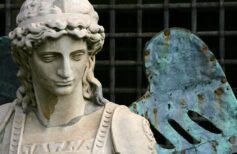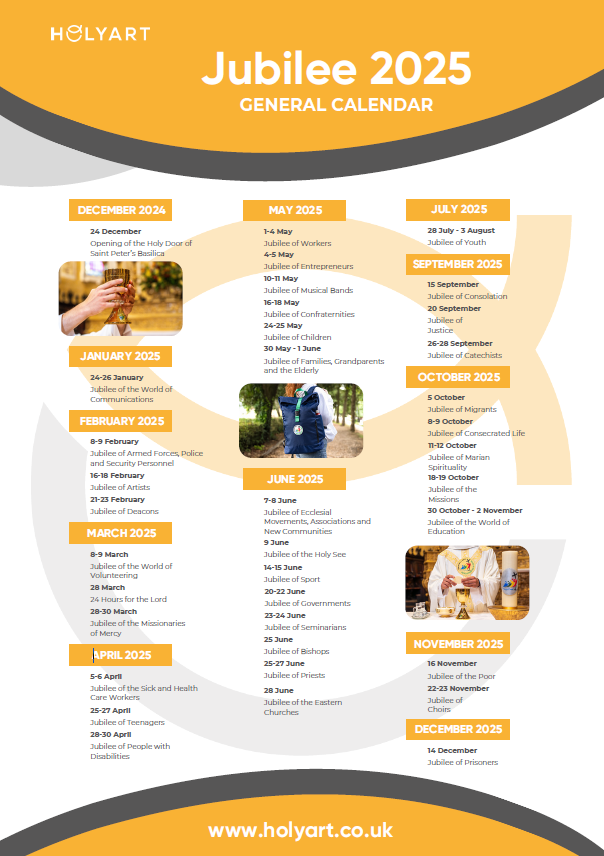October is one of the months dedicated to the Holy Rosary, but there are other ways to address God every day. Here is the prayer for good humour.
Contents [hide]
The choice to identify October as one of the months dedicated to praying the rosary stems from a historical fact: on 7 October 1571, the Holy League won the Battle of Lepanto against the Ottoman Empire, marking the decline of Muslim dominance in Europe. Pope Pius V, who had blessed the Holy League’s banner, declared that it was the merciful intercession of the Virgin Mary that led the Christians to victory and consecrated 7 October to Our Lady of Victory. His successor, Pope Gregory XIII, changed the dedication to Our Lady of the Rosary. But what does the prayer for good humour have to do with this story and with October, the month of the rosary?

October: the month of the Holy Rosary
What is the connection between the fall month with what is probably the most important and popular devotional form in the world…
“Rejoice always, pray without ceasing, in everything give thanks” (1 Thessalonians 5:16-18). Saint Paul exhorts us in this way, reminding us that God is joy and that we are all invited to maintain good humour even in the most difficult moments, even when the worries, concerns, and vicissitudes of life become more pressing. And Pope Francis seems to be firmly convinced of this because, for many years, he has recited a daily prayer for good humour, which is not only an act of devotion and faith but also a sort of personal encouragement to not lose the smile and sense of humour in every circumstance.

Here is how we can pray during this special month: on one hand, remember that October is the month of the rosary and that we can turn to the Madonna and to God with this powerful and unique prayer, a true instrument of personal and communal salvation, perhaps inspired by Saint Dominic of Guzmán, founder of the Dominicans. On the other hand, let’s not lose our good humour and sense of humour, and let’s imitate Pope Francis and his prayer for good humour, written many centuries ago by Saint Thomas More, yet still so relevant every day.
The Madonna and Saint Dominic of Guzmán
Saint Dominic of Guzmán was animated by a fervent and deep devotion to the Virgin. It was precisely during an apparition of the Madonna that she handed him the Holy Rosary. The Saint had been kidnapped by pirates and was travelling on a ship caught in a storm when the Virgin presented him with the Holy Rosary as the only salvation from shipwreck and the death of all on board. The Saint informed his captors, who listened to him, and immediately the fury of the sea calmed down. The pirates were the first members of the Confraternity of the Rosary.
Thanks to Saint Dominic and the order of preachers he founded, the Rosary acquired the form that we still know and practise today, with the central role of the Virgin Mary and the circular movement that expresses the spiritual journey of the faithful, their gradual approach towards God. In this month and always, we should use it as an instrument of personal meditation and prayer.

Saint Dominic of Guzman and the delivery of the rosary
Saint Dominic of Guzman, the saint in love with Christ, lived his life dividing himself between preaching and prayer…
Pope Francis’s Prayer
Pope Francis has recounted on various occasions which prayers he prefers and that accompany him every day. The Pontiff begins each day with the Morning Office, one of the Canonical Hours that is part of the Liturgy of the Hours and was originally celebrated at dawn. The Office opens with the introductory verse from Psalm 69, “O God, come to my assistance,” followed by the Gloria and the acclamation Alleluia.
The Pope continues his day of prayer by reciting the Rosary, and in the evening, he spends an hour before the Blessed Sacrament for evening Eucharistic Adoration. He also speaks of a special prayer he recites in the evening before going to bed, which begins with the supplication “Lord, if you will, you can cleanse me!” followed by five Our Fathers, one for each wound of Jesus.

Finally, as mentioned at the beginning, the Pope recites the prayer for good humour by Thomas More, the famous English politician and humanist who lived at the turn of the 15th and 16th centuries and was proclaimed a saint after being executed for refusing to acknowledge the King of England’s Act of Supremacy over the Church and for not wanting to disown the Pope.
Prayer for Good Humour
Lord, grant me a good digestion and also something to digest.
Grant me the health of the body and the good humour necessary to maintain it.
Grant me, Lord, a simple soul that knows how to treasure all that is good and does not get frightened at the sight of evil, but rather finds a way to set things right.
Give me a soul that does not know boredom, grumblings, sighs, and laments, and do not allow me to be overly concerned about that troublesome thing called “I.”
Give me, Lord, a sense of good humour. Grant me the grace to be able to take a joke, to discover a bit of joy in life, and to be able to share it with others.
Amen.


























